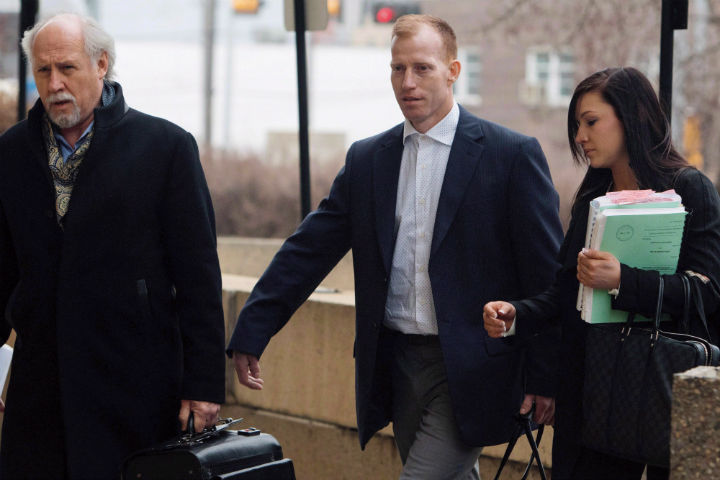The defence lawyer for Travis Vader says the fact that a judge threw out another first-degree murder case in Alberta because it took too long to get to trial could impact his client’s case.

In a surprise ruling obtained by Global News, Lance Matthew Regan had his charge of first-degree murder stayed on Friday, Oct. 7.
In the ruling, Justice S.D. Hillier said Regan’s right to be tried within a “reasonable time” was violated. He was accused in the stabbing death of Mason Tex Montgrand, 21, a fellow inmate at Edmonton Institution, on Aug. 16, 2011.
READ MORE: Alberta murder case thrown out over trial delays; experts warn system on verge of collapse
Brian Beresh, Vader’s lawyer, says the Regan decision could affect his client’s case.
“It sets a standard in a very serious case where if the prosecution can’t get its case together, then it simply can’t proceed because of Section 11B,” he said.
“It sets a good precedent for the Vader case and, in our view, that Vader is even probably further over the line than Mr. Regan. In Mr. Vader’s case, the defence has really done nothing at all to delay this case. Throughout, as you know, Mr. Vader has wanted his day in court. It’s been delayed several times, because of prosecutorial tactics and because of disclosure problems, police problems, so we think we’re probably in a better position than Mr. Regan was in,” Beresh said.
READ MORE: Court doc says shortage leaves Alberta judges ‘without requisite time’ for cases
In the Regan decision, Justice Hillier cited the landmark Supreme Court of Canada ruling R. v. Jordan, which set out a new framework for determining whether a criminal trial has been unreasonably delayed.
According to the framework, an unreasonable delay would be presumed should proceedings — from the date of charge to conclusion of a trial — exceed 18 months in provincial court, or 30 months in superior court.
The original application brought forward by Regan’s lawyer Tonia Grace, pointed to a lapse between the initial charge and the expected conclusion of trial, calculated at 62.5 months.
“We are very close to that, if not in excess of it,” Beresh said of Vader’s timeline.
READ MORE: 3 Alberta sex assault cases rescheduled for 2017 due to judge shortage
The R. v. Jordan ruling also notes there can be exceptional circumstances in “particularly complex” cases that would allow for an exception. However, Beresh doesn’t believe the Vader case would be considered an exception.
“I don’t think it’s an exception. Mr. Vader’s case was not a legally complicated case. Factually, there were a lot of facts. Some might argue that the facts were complicated, but legally, the case was not that difficult. It was fairly straight-forward actually.”
Regan’s case had not reached trial. It was scheduled to start Oct. 17, 2016. Vader’s case has already been to trial. In September, he was found guilty of second-degree murder in the 2010 killings of Lyle and Marie McCann. However, his lawyers have asked for a mistrial.
READ MORE: Travis Vader case: Judge weighs mistrial after flawed murder verdict
“We take the position that because of the major error made in this trial, that the only remedy is going to be for Mr. Vader to have a new trial,” Beresh explained. “And of course his right to a trial within reasonable time continues to run.”


Comments